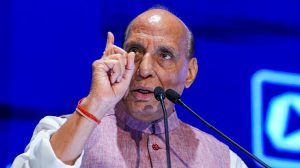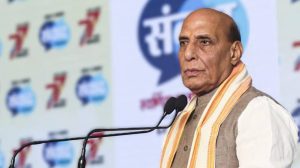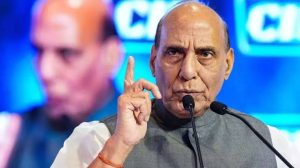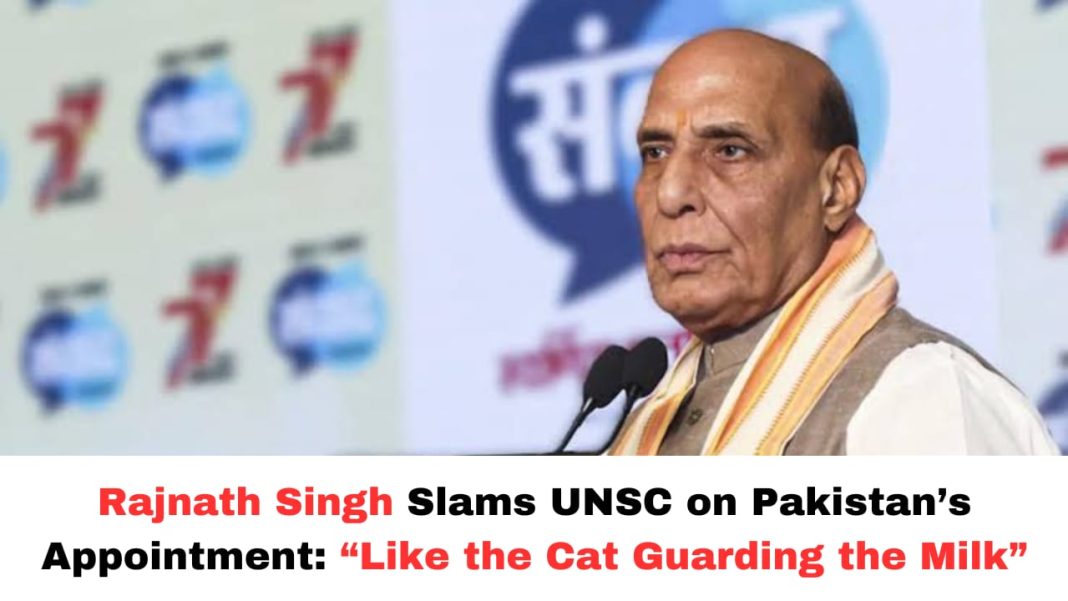Digital News Guru National Desk:
Rajnath Singh’s Scathing Rebuke of the UNSC
On June 10, 2025, Defence Minister Rajnath Singh unleashed a fierce critique against the United Nations Security Council after Pakistan was named vice‑chair of the counter‑terrorism committee. Speaking during a public event in Dehradun, Singh employed a vivid metaphor: the appointment is “like asking the cat to guard the milk”—a pointed rebuke aimed at Pakistan’s persistent record as a terror safe haven.
The Metaphor Unpacked
Singh’s analogy resonated deeply. A cat guarding a milk bowl implies a conflict of interest: it is the last creature you’d trust with something precious. Similarly, Singh questioned whether Pakistan—long accused by India of harboring terrorists—should lead global efforts against terrorism. He argued that its involvement in the committee undermines the credibility of international counter‑terrorism mechanisms.

Accusations of Terror Tolerance
Singh did not mince his words on Pakistan’s alleged sponsorship of terror. He cited the dossiers on individuals like Hafiz Saeed and Masood Azhar, whose shelters in Pakistan—Singh claimed—prove the allegation of state complicity. By spotlighting this, he underscored why India views Pakistan’s elevated role in the UNSC as intolerable.
This rhetoric is hardly isolated. India has repeatedly accused Pakistan of playing a “dangerous game” with terrorism, going as far as demanding extradition of these militant figures. Such uncompromising posture reflects a pattern of pressure both on the global stage and within the domain of bilateral relations.
Context: UNSC Committee Appointments
Pakistan’s naming as vice‑chair did not occur in isolation. As a non‑permanent member of the UNSC (elected in June 2024 for 2025–26), Pakistan has positioned itself to champion certain counter‑terrorism panels. However, its attempt to proceed beyond leadership of the 1988 Taliban Sanctions Committee reportedly met resistance—most members consented only to that single assignment.
India criticized this as more than procedural: it was seen as a signal of compromised global resolve, with Singh stating that such appointments threaten the integrity of the counter‑terrorism agenda.
Broader Diplomatic Strategy
Singh’s comments fit into a broader Indian diplomatic narrative:
- Terror-first talks policy: He reaffirmed that any dialogue with Pakistan must be strictly limited to terrorism and the status of Pakistan‑occupied Kashmir (PoK)—there would be no comprehensive engagement until these core issues are resolved.

- Nuclear scrutiny: In mid‑May, Singh described Pakistan as a “rogue nation with nukes,” urging that its nuclear arsenal be monitored by the International Atomic Energy Agency (IAEA). He argued that nuclear capability combined with terror-patronage represents a dangerous global cocktail.
Together, these statements reflect India’s strategy to elevate the global discussion from bilateral conflict to systemic risks—from terror sponsorship to nuclear proliferation.
Domestic Reaction and Global Implications
Singh’s words struck a chord domestically, giving further traction to the ruling National Democratic Alliance (NDA) govt’s hardline posture. These statements also play well in international forums, reinforcing India’s narrative that Pakistan has repeatedly failed to meet international norms on terrorism.
Yet the timing raises questions. Pakistan’s role as vice‑chair is a reflection of its UNSC membership, potentially diminishing India’s influence in this domain. Singh’s rebuke might help shore up India’s diplomatic posture, but it may also risk pushing Pakistan further into defensive posturing rather than productive engagement.
What Comes Next?
- UNSC Follow‑Up
India may proactively lobby other UNSC members to restrict Pakistan’s access or influence within the counter‑terrorism committee. There’s also pressure for stricter monitoring and stricter compliance reviews.
- Regional Tensions
Singh’s remarks arrive amidst heightened India–Pakistan tension—from Operation Sindoor missile strikes in May to recent diplomatic standoffs. Any misstep could trigger a flare-up along the Line of Control (LoC).
- Global Diplomatic Messaging
India will likely intensify its diplomatic messaging: leveraging global platforms like the G‑20 and SCO to press Pakistan’s record. Singh’s statement is an anchor for this narrative.

Final Takeaway
Rajnath Singh’s blistering “cat-and-milk” metaphor is more than rhetoric—it’s a calculated declaration of intent. It signals India’s refusal to accept what it perceives as hypocritical leadership in terror‑fighting institutions and sets the stage for a tougher diplomatic line. Whether this intensifies scrutiny on Pakistan or further polarizes global counter‑terror cooperation depends on how the UNSC and allied nations respond.
You May Also Read: Karan Johar on Bollywood’s “Herd Mentality”, Slams Bollywood’s Copycat Culture








